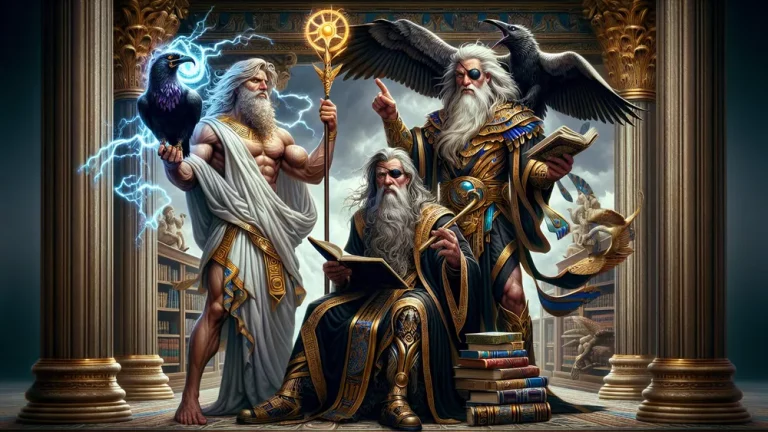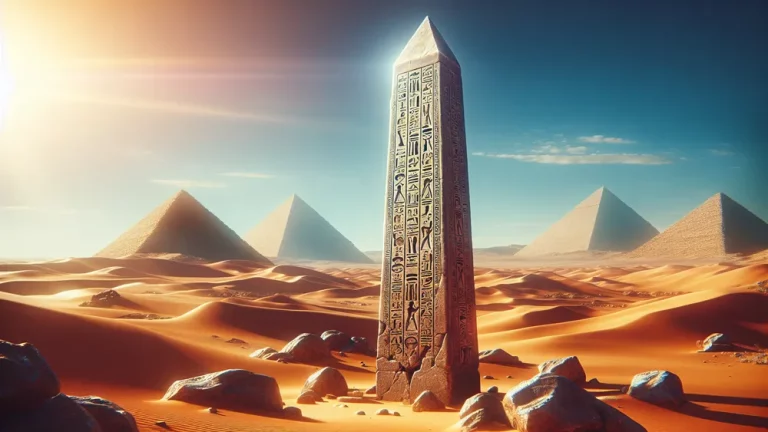Famous Love Stories In Greek Mythology: Gods And Mortals
Greek mythology’s love stories mix passion, tragedy, and divine meddling in fascinating ways. They show us how ancient Greeks viewed desire, fate, and human weakness. Picture gods scheming. Mortals fight fate, while love changes lives forever. These tales range from Zeus’s stormy marriage to Hera to Orpheus losing Eurydice. They aren’t just entertainment – they make us think about loyalty, jealousy, and sacrifice.
Key Points:
- Zeus and Hera’s marriage was full of cheating and revenge, with Hera punishing Zeus’s lovers.
- Aphrodite and Ares had a scandalous affair, caught in a golden net by Hephaestus.
- Hades took Persephone to the underworld, but she returns yearly, causing the seasons.
- Eros and Psyche faced tough tasks to stay together, proving love can overcome obstacles.
- Apollo chased Daphne, who turned into a laurel tree to escape him.
- Orpheus lost Eurydice forever because he looked back too soon.
- Pyramus and Thisbe died due to a misunderstanding, inspiring tragic love stories like Romeo and Juliet.
As you read, you’ll see patterns. Gods break rules for human lovers. Petty rivalries keep couples apart. Some lovers turn into stars or flowers, symbolizing bonds that last. Hades’ rare loyalty to Persephone stands out. Aphrodite’s affair with Ares reveals scandal and desire. Different poets tell these stories differently. Was Persephone kidnapped? Or did she choose Hades? The details change, but the emotions stay the same. Ready to explore these love stories?
Let’s begin.
Love Stories In Greek Mythology: Overview and Key Facts
| Category | Couple | Key Points | Symbols/Themes | Variations (if any) |
|---|---|---|---|---|
| Divine Couples | Zeus and Hera | Zeus constantly cheated, which angered Hera. She punished his lovers, like Io and Europa. | Lightning (Zeus), Peacock (Hera) | Some say Hera accepted his affairs as part of how the gods worked. |
| Aphrodite and Ares | Aphrodite (love) and Ares (war) had a secret relationship. Hephaestus trapped them in a golden net to humiliate them. | Golden net (betrayal), Rose (desire) | Some myths call Eros their child, though older stories say he existed from the beginning. | |
| Hades and Persephone | Hades took Persephone to the Underworld. Demeter’s sadness created winter. Persephone ate pomegranate seeds, forcing her to return yearly. | Pomegranate (fate), Wheat (life cycle) | Ovid’s version suggests Persephone eventually loved Hades. | |
| Gods and Mortals | Eros and Psyche | Psyche, a mortal, had to complete dangerous tasks to marry Eros. Aphrodite tried to stop them. | Butterfly (change), Lamp (secrets) | Roman writers added more trials than Greek versions. |
| Apollo and Daphne | Apollo chased Daphne. To escape, she turned into a laurel tree. | Laurel tree (unfulfilled love) | Some say Daphne asked the earth or her father for help. | |
| Anchises and Aphrodite | Aphrodite pretended to be human. She seduced Anchises, and their son Aeneas founded Rome. Because Anchises bragged, Zeus made him lame. | Golden apple (temptation) | Homer’s Iliad doesn’t mention Aphrodite punishing Anchises. | |
| Tragic Mortals | Orpheus and Eurydice | Orpheus got Eurydice back from the Underworld. But he looked back too soon, and she vanished. | Lyre (art’s limits) | Virgil says she faded slowly; Ovid says she was pulled back instantly. |
| Pyramus and Thisbe | Forbidden lovers who talked through a crack in a wall. A mistake led to their suicides under a mulberry tree. | Mulberry tree (love ending in death) | Only Ovid’s Metamorphoses tells this story. | |
| Hero and Leander | Leander swam the Hellespont every night to see Hero. He drowned in a storm, and she jumped into the sea after him. | Lighthouse (hope), Sea (loss) | Some say Poseidon blew out Hero’s guiding lamp. |
Love Stories of the Gods
The Olympians had dramatic love lives. These notorious stories show their passionate but chaotic relationships.
Zeus and Hera: A Stormy Marriage
Zeus and Hera were considered the perfect match as king and queen of Olympus, but their marriage was full of constant drama. As goddess of marriage, Hera had to put up with Zeus’s endless cheating, while he used his powers to chase after countless women. Their relationship shows us how the Greeks saw gender roles and power dynamics among the gods.
Their fights followed the same pattern. Zeus would either seduce or kidnap a mortal woman or goddess. When Hera found out, she would punish either the woman or their children. Some of Zeus’s most famous lovers include:
- Io: He changed her into a white cow to hide her
- Europa: Zeus became a bull and carried her to Crete
- Leda: Appeared as a swan to seduce her, fathering Helen of Troy
- Danaë: Came to her as golden rain, resulting in Perseus
- Alcmene: Disguised as her husband to conceive Heracles
Hera took revenge in different ways. She turned rivals into animals or created impossible challenges (like Heracles’ labors). Some stories suggest Hera wasn’t just jealous – she wanted to protect the sacred nature of marriage. In one version, she even rebels against Zeus by creating Hephaestus alone.
Zeus and Hera’s marriage was stormy, with his constant affairs and her fierce revenge, revealing Greek views on power and marriage.
Aphrodite and Ares: Scandal and Desire
The famous affair between Aphrodite (love) and Ares (war) caused a major scandal among the gods. According to Homer’s Odyssey, Hephaestus made a golden net that couldn’t be seen and used it to catch the couple together. He then called all the gods to see their shame, which became one of the most well-known stories in Greek myths. The other Olympians laughed at the trapped lovers.
Eventually Poseidon arranged their release. Some versions say this humiliation made their passion stronger. Their relationship supposedly produced children like Eros and Harmonia, combining love and war in their offspring. This story shows how Greeks saw love as powerful but often causing trouble, even for gods.
Hades and Persephone: From Kidnapping to Love
The story of Hades and Persephone started with forced marriage. Hades kidnapped Persephone while she was picking flowers, taking her to the underworld. Demeter was so upset that she stopped plants from growing, which caused winter to begin. This forced Zeus to step in and help. The pomegranate seeds deal explains why seasons change. Because Persephone ate six seeds (in most versions), she had to spend part of each year with Hades.

When she returns each spring, plants grow again. Her autumn departure brings the harvest season. Later traditions showed changing perspectives about their relationship. The Eleusinian Mysteries, a secret religious group, saw their marriage as sacred. Archaeological finds suggest some Greeks viewed them as a powerful couple ruling the underworld together – very different from the original kidnapping story.
When Gods Fell for Mortals
The Olympian gods didn’t only love other gods. Some of their most famous relationships were with mortal lovers, and these became legendary stories.
Eros and Psyche: Love Tested by Trials
This Roman myth tells how Psyche, a beautiful princess, made Aphrodite jealous. Aphrodite sent her son Eros to make Psyche love a monster, but he accidentally pricked himself with his own arrow and fell in love with her instead. They married secretly with one rule: Psyche could never look at her husband’s face. When she broke this secret marriage rule by lighting a lamp to see him, Eros left.
This forced Psyche to face Aphrodite’s anger, which led to several difficult challenges.

Psyche had to complete four difficult tasks:
- Sorting grains: Separating a huge pile of mixed grains (ants helped her)
- Golden Fleece: Getting wool from dangerous sheep (a river god told her how)
- Black Water: Collecting water from the River Styx (an eagle helped)
- Underworld Journey: Bringing back a box from Persephone (she almost failed by opening it)
At first, Psyche was just a beautiful woman. Through these challenges, she became stronger and more determined. Earlier versions focus on Eros saving her, but Apuleius’s story shows Psyche earning her immortal status through hard work. When they finally reunited and Zeus made Psyche a goddess, the story changed from just a love story to one about personal growth.
Apollo and Daphne: Love That Turned to Leaves
In Ovid’s Metamorphoses, Apollo insults Eros’ archery skills, which was a bad idea. For revenge, Eros shot Apollo with a golden arrow that made him love Daphne. He shot Daphne with a lead arrow that made her reject Apollo. Apollo, the god of reason and art, became desperate as Daphne ran away quickly. When Apollo almost caught her, Daphne prayed to her father Peneus.
He changed her into the first laurel tree just in time. Apollo’s arms became branches around the tree. He declared the laurel his sacred plant. The outcome was mixed – Apollo got his sacred plant but lost Daphne permanently.
Apollo mocked Eros and got tricked into loving Daphne, who turned into a laurel tree to escape him, leaving Apollo with only the tree as his sacred symbol.
Anchises and Aphrodite: A Secret Affair
Aphrodite pretended to be mortal, taking the form of a Phrygian princess to meet Anchises, a handsome Trojan shepherd. She created a detailed false story, saying Hermes brought her to Mount Ida to marry him. Their relationship produced Aeneas, but Aphrodite couldn’t hide her godly appearance after they were together and had to reveal her true identity.
This was unusual because Aphrodite typically made others fall in love rather than feeling it herself. The results were harsh – Zeus hit Anchises with lightning punishment for bragging about their affair, though some stories say he was only injured. This shows the common pattern where relationships between gods and mortals end badly. However, their son Aeneas became important.
He survived Troy’s destruction and later founded the early settlement that would lead to Rome, as Virgil’s Aeneid describes. This brief relationship ultimately connected Greek myths to Roman history through their half-god son.
Love Stories with Sad Endings
Not all mythological love stories ended with godly marriages or happy changes. Some became warnings where love couldn’t win, even when it was genuine. These stories show that even for gods, the human consequences were often worst.
Orpheus and Eurydice: A Glance That Cost Everything
Eurydice died from a snakebite on their wedding day. Orpheus did something incredible – he went to the Underworld with only his lyre. His music stopped punishments temporarily – Sisyphus paused, Tantalus rested, and Hades was persuaded. The god agreed to free Eurydice with one simple rule: Orpheus couldn’t look back until they reached the surface. Orpheus walked through darkness, listening for Eurydice behind him. When they almost reached the surface, he looked back.
He saw Eurydice’s spirit disappearing as she said “Farewell”. Some versions say she was already gone, making his doubt the real tragedy. This showed how easily trust can break when tested. Afterwards, Orpheus became the grieving artist archetype. His later death mirrored his loss. The story inspired the Orphic mysteries, which focused on the soul’s afterlife journey. Today, it remains a powerful lesson about patience and believing without seeing.

Pyramus and Thisbe: A Love Doomed from the Start
In Babylon, two young neighbors fell in love despite their families’ bitter feud. They talked through a wall crack, hiding from their families – much like passing notes today. They planned to meet at Ninus’ tomb under a white mulberry tree. Thisbe got there first but ran from a lioness. The animal’s bloody mouth stained her dropped veil.
When Pyramus found the torn veil, he thought she was dead and stabbed himself with his sword. His blood turned the berries dark purple permanently. Thisbe returned and killed herself with the same sword. The mulberry tree stood as a reminder of their love. This story’s pattern – missed meeting, fatal misunderstanding, and double suicide – made it the model for love tragedies.
It directly inspired Romeo and Juliet. Unlike other myths with godly interference, here simple mistakes and bad luck caused the tragedy, making it feel very human.
Hero and Leander: Love Lost to the Sea
Hero and Leander lived on opposite sides of the dangerous Hellespont strait. Every night, Hero lit a lamp in her tower as a signal, while Leander swam across the water. This dangerous nightly routine required courage from both. One winter night, a storm blew out Hero’s lamp. Without the light to guide him, Leander got lost in the water and drowned.
His body washed up on shore the next morning. When Hero found him, she was overcome by sadness and jumped from her tower. This story showed how love can fail because of simple bad luck. The Hellespont (now called Dardanelles) was both a real geographical challenge and a reminder of how obstacles can keep lovers apart.
Unlike other myths with gods interfering, here just a storm caused the tragedy.

Symbols and Lessons in Greek Love Tales
These Greek love stories aren’t just exciting tales. They hide important messages in objects and themes that appear again and again. Now we’ll see how ordinary items became meaningful symbols that show love’s challenges and difficulties.
Forgotten Love Stories Worth Knowing
Everyone remembers the most famous stories from Greek mythology. But there are many forgotten love tales that teach us just as much about ancient Greek views on relationships. These less-known stories show us different sides of how people thought about love long ago.
Alcyone and Ceyx: Love That Changed Them Forever
Ceyx, king of Trachis, died in a shipwreck after his wife Alcyone warned him not to go. The gods felt sorry for her constant watching at the beach, waiting for his return. Showing unusual kindness from the gods, Morpheus made Ceyx’s spirit appear to Alcyone in a dream, where he showed his fate. This was similar to when people sense tragedy before being told.
Their story includes these important changes:
- Alcyone jumped into the sea to be with her dead husband
- Both turned into halcyon birds (kingfishers)
- Zeus ordered calm seas when they nested (creating “halcyon days”)
Their lasting connection changed natural events. As birds, they still mate for life, and Mediterranean winters stay calm during nesting season. This myth explains both kingfishers and the winter calm in that region. Unlike other myths with angry gods, this one shows deities rewarding true love by letting it continue after death.
The gods took pity on Alcyone’s grief and turned her and her drowned husband into kingfishers, making the sea calm when they nest to keep their love alive.
Iphis and Ianthe: A Miracle of Love
This is one of mythology’s most unusual love stories. Iphis, a girl from Crete, was raised as a boy by her mother Telethusa because her father wanted baby girls killed. But then she fell in love with her childhood friend Ianthe, which caused a big problem when their marriage was arranged. As the wedding day got closer, Telethusa begged for help from the goddess Isis.
The Egyptian goddess then changed Iphis’s body to match how she had lived as a man. This meant the couple could marry, giving them a happy ending that showed the gods approved their love. Ovid saved this story in his book Metamorphoses. It’s special among Greek myths because it shows love changing physical reality through godly help.
The Egyptian goddess Isis appearing in a Greek story also shows interesting Egyptian-Greek connections in ancient times.
FAQs
1. Who is the Greek goddess of love?
The Greek goddess of love is Aphrodite, born from sea foam and revered for beauty and desire.
2. What is the most tragic love story in Greek mythology?
The most tragic love story in Greek mythology is Orpheus and Eurydice, whose reunion was undone by a single, irreversible glance.
3. Did Zeus ever remain faithful to Hera?
Zeus never remained faithful to Hera, as his countless affairs with mortals and goddesses were central to Greek myths.
4. What symbolizes eternal love in these myths?
What symbolizes eternal love in these myths are pomegranate seeds and the laurel tree.







